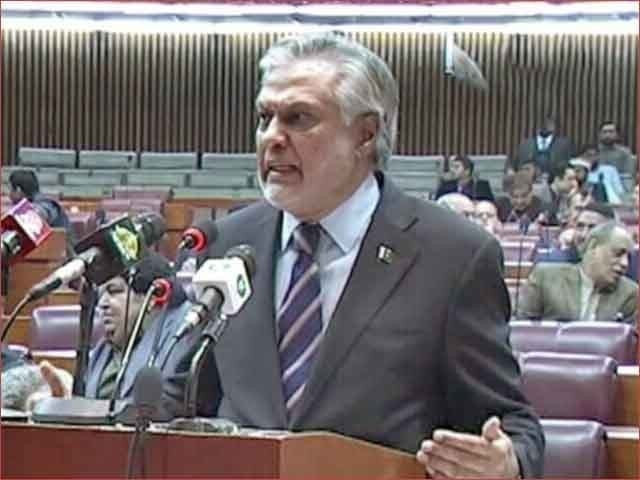Dar terms reports on new taxes ‘great misunderstanding’
Rules out more levy on agri, construction sectors

Finance Minister Ishaq Dar on Friday ruled out any new taxation on agriculture and construction sectors, clearing confusion that was caused by a document that the Finance Ministry submitted before the International Monetary Fund (IMF) for the $3 billion deal.
“I want to categorically state that no new tax would be imposed on the agriculture and construction sectors,” Dar said while addressing a National Assembly session. “We have already endured the pain, and met all prior actions of the IMF programme”, he added.
The minister said that around a dozen newspapers had published that taxes would be imposed on the construction and agriculture sectors.
“This is the result of serious misunderstanding,” Dar said.
However, at the roots of the misunderstanding was the Memorandum for Economic and Financial Policies (MEFP) document that the Finance Ministry had submitted to the IMF as part of its request for the $3 billion Stand-by Agreement.
“Passed by the National Assembly on June 25, 2023 and signed into law by the president on June 26, 2023, our FY24 budget advances fiscal consolidation through a primary surplus of Rs401 billion —built on a set of credible measures that help: (i) sustainably raise additional revenue by targeting undertaxed sectors such as agriculture and construction,” according to the Ministry of Finance’s MEFP document that was sent to the IMF.
The IMF released the MEFP document along with the staff report this week. In the same report, the government mentioned the amount of tax that it would collect from these sectors.
The government told the IMF that it would collect additional Rs19 billion on second homes and other high-wealth items from non-filers at 1% of the value. “This tax at an effective rate of 1% was enacted from July 2022, with a threshold of Rs25 million and first homes excluded.
The Finance Act, 2023 abolished the threshold and exclusion of first homes for non-filers, with no changes for those on the active taxpayer list,” the Finance Ministry stated in the MEFP.
It added that by raising the advance tax from builders and developers based on land size of the project under development, the government would yield Rs15 billion.
“By increasing the advance tax on the purchase and sale of immovable property from 2% to 3%, we expect to add sustainable revenue of Rs46 billion,” according to the MEFP.
Dar once again claimed that the government took Rs215 billion “fiscal measures” for the new programme.
However, the MEFP document showed Rs254 billion measures. There is a complete tax-wise breakup of Rs254 billion measures in the report.
The finance minister told the lower house that all documents pertaining to the IMF programme, including the MEFP and the Letter of Intent (LoI), would be made available on the Ministry of Finance’s website.
Dar said that Pakistan would receive a second loan tranche of $700 million from the IMF in November after the second review.
The remaining $1.1 billion would be disbursed in February next year after the third review, he added.
In the LoI submitted by the government to the IMF, the government also reiterated its commitment not to launch any new tax amnesties or grant any new tax exemptions in FY 2023-24, including through the budget or statutory regulatory orders (SROs) without prior National Assembly approval.
The IMF report stated that the SBP conducted a thematic AML/CFT inspection in relation to the last tax amnesty for the construction sector and issued fines against financial institutions for AML/CFT shortcomings.
It encouraged banks to develop internal guidelines on mitigating potential risks associated with tax amnesty programmes.
Pakistan told the IMF that it identified several structural impediments facing the housing and construction sector, including land title documentation; real estate regulatory authorities; availability of long-term financing; foreclosure laws; and credit scoring.
It said that headway is being made to address some of these constraints and the government recognised the need for more work, in partnership with private sector participants and representatives from provincial governments.
While commenting on the reserves position, Dar said that Pakistan’s reserves had started building up after the IMF deal.
The reserves held by the State Bank of Pakistan (SBP) surged by $4.2 billion to $8.7 billion as of July 14.
During the week ended on July 14, 2023, the SBP received $2 billion from Saudi Arabia, $1.2 billion from the IMF and $1 billion from the United Arab Emirates (UAE).
Dar said the government intended to maintain the position at a level similar to what it inherited at the start of its tenure. He also hoped that the inflation rate would come down to 7% after two years.
The SBP worked out that in the coming two years, the inflation rate in Pakistan would decrease to 7% if the current government’s policies continue, the finance minister said.
However, the central bank has been saying for a long time that after two years, the inflation would come down to 7% and every time its working has proven wrong.
The IMF said in its report that the central bank did not have a clear strategy to deal with the increasing inflation in the country.



















COMMENTS
Comments are moderated and generally will be posted if they are on-topic and not abusive.
For more information, please see our Comments FAQ